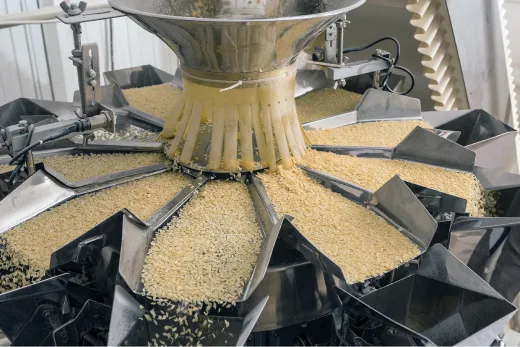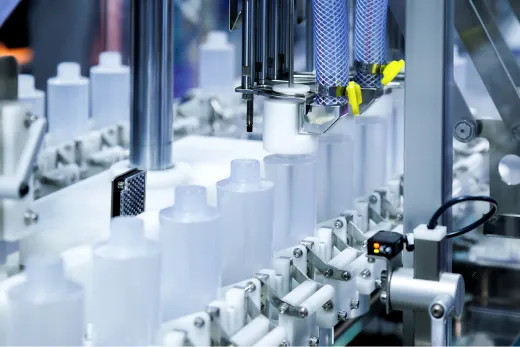From acquisition of Halal certification
to design and construction of Halal-certified factories
The Muslim market is gaining significant attention from Japanese companies in the food, pharmaceutical, and cosmetics industries.
With population growth, increasing interest in Japanese culture, and the development of local supply chains providing ingredients for a growing Muslim market, Halal certification of products and services for target categories has become essential.
Indonesia will implement mandatory Halal certification for food and beverage products starting in October 2024. Malaysia is also strengthening its Halal industry through the Halal Industry Master Plan 2030, which was put into effect in March 2023.
CM Plus has been providing engineering and consultation services for manufacturing facilities in Southeast Asia. In light of the impact of changes in Halal certification on our customers, we have partnered with Halal certification consultants in Indonesia and Malaysia to provide support from acquiring Halal certification to the design and construction of actual Halal-certified factories. Our subsidiaries in Southeast Asia and our Muslim employees provide one-stop support from consultation to design and construction of Halal-compliant factories with professionals in production facility engineering.
Do you have any of these concerns?
- You would like to quickly implement Halal compliance in response to the trend toward mandatory Halal certification.
- You want to ensure that your factories and products are Halal-compliant, but are unsure what type of manufacturing facilities and management systems you need (for existing factories/new factories and existing products/new products).
- You are looking for a Halal-compliant manufacturing contractor.
- You seek a partner who can manage everything from acquiring Halal certification to implementing specific measures for your manufacturing facilities.

In CM Plus
- We offer comprehensive support for Halal certification. Our team is affiliated with overseas Halal specialists and is dedicated to providing you with the latest information to optimize the certification process. We encourage you to consult with us regarding your food products, cosmetics, and pharmaceuticals.
- We will guide you on the specific requirements and restrictions based on your situation, whether your entire factory is Halal-compliant or only certain products are.
- We help identify manufacturing contractors that adhere to Halal compliance standards. Additionally, we offer comprehensive evaluation and auditing services to ensure alignment with these requirements.
- We offer one-stop support from acquiring Halal certification to assisting with manufacturing facilities.
Our Strengths
Strength (1) Partnering with Halal Certification Consultants in Indonesia and Malaysia

We have established partnerships with Halal certification consultants in Indonesia and Malaysia to assist with the acquisition of Halal certification, as well as education and training. Utilizing the latest local information, we will optimize the process and timeline for obtaining certification and provide comprehensive support.
Strength (2) Presence of Subsidiaries in Southeast Asia and Muslim Employees in Japan and Indonesia

Our workforce includes Muslim employees in both our head office in Japan and our subsidiary in Indonesia. This enables smooth operations without language, cultural, or customary barriers.
Strength (3) Expertise in Production Facility Engineering Professionals

As specialists in production facility engineering, we offer support from the initial consultation regarding Halal-compliant factory requirements to the actual design and construction of the facilities.
Halal Certification Process and Inspection Points
Since certification by an organization recognized in the destination country is required for the final product, the first step is to determine which countries to target. This includes considering potential multiple markets and prospects, as well as identifying acquisition methods and certification organizations.
Halal Certification Process
The general flow of the procedure for obtaining Halal certification is as follows STEP0 Preparation for application

| STEP0 | Preparation for application |
| STEP1 | Preparation of application documents |
| STEP2 | Submission of application documents |
| STEP3 | Document review |
| STEP4 | On-site physical inspection of factory and products |
| STEP5 | Deliberation by the certification body |
| STEP6 | Acquisition of Halal certification and issuance of certificate |
Inspection Points
The points of inspection are as follows
| Point 1 | Ingredients |
| Raw materials are screened to determine their Halal status. This includes checking for the presence of pork, pork-derived ingredients, and alcohol, as well as ensuring that any meat has been processed following Halal guidelines. | |
| Point 2 | Manufacturing Process and Storage Conditions |
| The inspection assesses whether the factory facilities, manufacturing processes, and sanitary conditions comply with Halal standards. It is crucial that Halal products are not contaminated during production or storage. | |
| Point 3 | Employee Training |
| Employees must understand Islamic law and the concept of Halal. This point evaluates the company’s educational efforts and its understanding of the needs of Muslim consumers. | |
| Point 4 | Management System |
| Some certification organizations in other countries require the employment of Muslims for Halal certification. In Japan, having a manager who has attended a seminar or training conducted by the certifying organization may be a requirement. |
Halal Certification Schedule

Inspection criteria differ by country and certification organization, typically taking six months to one year from the initial consultation.
Halal Certification Cost

Certification costs vary based on the application scheme and certification body, ranging from several hundred thousand yen for restaurants to several million yen for factories. These costs depend on factors such as the type of product or service being certified, the size of the company, the number of products and factories, and the regulations set by each certification organization.
Additionally, after obtaining certification, there are annual operating fees and logo usage fees that must also be paid.
Renewal of Halal Certification

Certification expiry depends on the certification body, but it is usually between one and four years. Some certification bodies only require renewal if there are changes in the production ingredient or process.
CM Plus Halal Consulting & Engineering
CM Plus offers one-stop support for Halal certification, including providing information, obtaining certification, and assisting manufacturing facilities with compliance.
Flow of Certification and Consulting
There are over 300 halal certification organizations worldwide; however, because there is no unified global standard, each organization has its own criteria and guidelines.
JAKIM in Malaysia and BPJPH in Indonesia are known to maintain the strictest certification standards in the world. Products certified by these two organizations are recognized for their high halal safety and reliability within the Islamic community. We have established partnerships with halal consulting firms in both Indonesia and Malaysia.
- JAKIM: The Halal certification body in Malaysia, which stands for Jabatan Kemajuan Islam Malaysia (Department of Islamic Development Malaysia).
- BPJPH:The Halal certification body in Indonesia, which stands for Badan Penyelenggara Jaminan Produk Halal (Halal Product Assurance Implementation Agency).
| The general flow of Halal certification | CM Plus/Consulting Services | ||
| STEP0 | Preparation for application | – Engineering and consulting services in accordance with HACCP, GMP, and other relevant standards – GAP analysis and program – Provision of GMP and Halal training |
|
| STEP1 | Preparation of application documents | |
– Assistance with documentation – Identification of raw materials |
| STEP2 | Submission of application documents | |
– Support for registration in the Halal certification system |
| STEP3 | Document review | ||
| STEP4 | On-site physical inspection of factory and products | |
– On-site support during audits – Follow-up assistance based on audit results |
| STEP5 | Deliberation by the certification body | ||
| STEP6 | Acquisition of Halal certification and issuance of certificate |
Support for Manufacturing Facility

To obtain Halal certification, it is essential to have the appropriate factory facilities and an effective management system. As highlighted in the key points of the audit, the manufacturing process, storage conditions, and management systems are critical. Halal certification bodies conduct on-site audits of both factories and products.
CM Plus offers tailored advice based on each customer’s unique situation, whether for existing or new factories, and for full or partial product compliance. We also support specific planning and design for necessary improvements.




Our Strength
- Partnering with Halal Certification Consultants in Indonesia and Malaysia
- Presence of Subsidiaries in Southeast Asia and Muslim Employees in Japan and Indonesia
- Expertise in Production Facility Engineering Professionals
Feel Free to Contact CM Plus
We provide services tailored to our clients’ needs. Feel free to contact us.
―TOPICS― Halal Certification Trends in Each Country
Useful information related to Halal is summarized here. ~Indonesia and Malaysia~
Trend in Indonesia
In Indonesia, the halal certification system has experienced significant changes in recent years. In 2019, Indonesia’s Halal Product Assurance Agency (BPJPH) was established under the Ministry of Religious Affairs and took over the responsibility for halal certification from the Majelis Ulama Indonesia (MUI), a private organization.

Then, in October 2024, the government announced a requirement for halal certification for all products entering, circulating, and trading within Indonesia, starting with food and beverage items. This law will be implemented in phases across different industries, with varying deadlines based on the scale of the business.
As a result of these changes, products exported from Japan will now require halal certification under the new system.
Trend in Malaysia
Malaysia has been a leader in the global halal industry for ten consecutive years. With the goal of establishing itself as a global halal hub—a center that oversees the production, distribution, and certification of halal products—in the areas of food and beverages, pharmaceuticals, and cosmetics, the Malaysian government established the Halal Development Corporation (HDC) in 2006. This organization was created under the then Ministry of Trade and Industry to promote the halal industry.

HDC’s mission is to enhance the global acceptance and recognition of Malaysian Halal standards while promoting the growth of Malaysia’s Halal industry. HDC actively works to establish a robust Halal certification system and supports Halal-related businesses. Additionally, they focus on disseminating information about Halal to an international audience. HDC is also responsible for the development and management of Halal industrial parks and attracting investment in this sector. There is a concerted effort to export products to the United Arab Emirates (UAE) and other Middle Eastern countries with significant Muslim populations.
On March 23, 2023, the Government of Malaysia launched the Halal Industry Master Plan 2030 (HIM 2030) to strengthen the halal industry.
Related News
Related Column
-
 Halal
Understanding Halal: Exploring the Global Muslim Population and Future Trends
Muslims are estimated to be the second largest religious group after Christians, numbering 1.6 billion people. They account for 23% of the world’s population, which translates to roughly one in every four people globally.
Halal
Understanding Halal: Exploring the Global Muslim Population and Future Trends
Muslims are estimated to be the second largest religious group after Christians, numbering 1.6 billion people. They account for 23% of the world’s population, which translates to roughly one in every four people globally.
-
 Halal
Choosing the Right Halal Certification Body and How to Get Certified
2025
There are said to be over 300 Halal certification bodies worldwide. What are the key points in selecting a suitable certification body? A list of major certification bodies from various countries is also provided.
Halal
Choosing the Right Halal Certification Body and How to Get Certified
2025
There are said to be over 300 Halal certification bodies worldwide. What are the key points in selecting a suitable certification body? A list of major certification bodies from various countries is also provided.
-
 Halal
Schedule for Mandatory Halal certification in Indonesia
Regarding the enforcement of mandatory Halal certification for food and beverages that commenced in October 2024, this also covers the postponement measures for small and medium-sized enterprises, as well as the upcoming schedule for the staged implementation of Halal certification requirements across different product categories.
Halal
Schedule for Mandatory Halal certification in Indonesia
Regarding the enforcement of mandatory Halal certification for food and beverages that commenced in October 2024, this also covers the postponement measures for small and medium-sized enterprises, as well as the upcoming schedule for the staged implementation of Halal certification requirements across different product categories.











